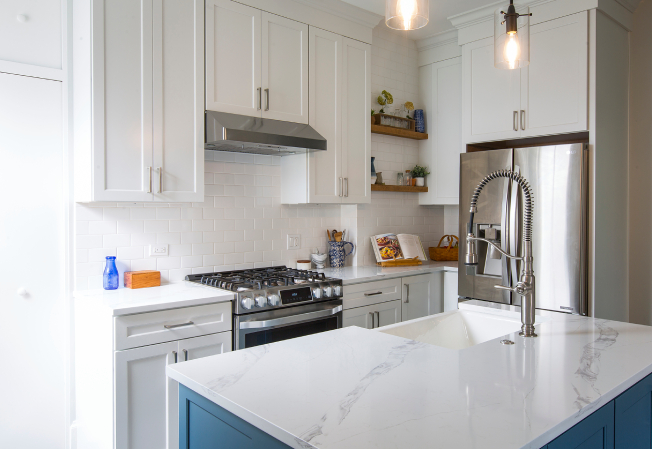With many manufactured countertops to choose from, your decision might be difficult but the care is always easy.

In a previous post, we talked about natural stone countertops for your kitchen remodel. Today, we’ll highlight some manufactured countertops to consider when renovating a kitchen.
Quartz
For the look of natural stone without the painstaking upkeep, you can’t beat quartz. Quartz countertops are engineered from ground quartz bound with resin into a durable surface to mimic the look of natural stone, marble, and granite. Because quartz countertops are manufactured, color and pattern options are easily customizable to your design. Countertops made from quartz are incredibly durable, relatively maintenance-free (no sealing necessary and easy cleanup), and non-absorbent, making them resistant to stains and bacteria. Harder than stone, quartz can take a beating without the risk of chipping but take care with hot cookware as this artificial surface is not heat-resistant. The cost of a quartz countertop can exceed natural stone, with the upside being a durable surface in a nearly endless palette of choices and a long, hassle-free life span.
Solid-Surface
Solid-surface countertops are another composite countertop option; this one is created from mineral dust mixed with a higher percentage of resin. (You might recognize them by the brand name Corian.) The advantages of solid-surface counters are many: budget-friendly, low-maintenance and easy to clean, non-porous (repelling stains and bacteria), and constructed in such a way as to avoid any visible seams. Solid-surface countertops aren’t heat resistant and can scratch, but the damage (scratches, stains, burns, or cuts) can be spot-repaired, a valuable benefit of a Corian countertop.
Wood/Butcher Block
Rustic and practical, a butcher block countertop is a good choice for a working kitchen where the countertop’s form links to its function. Cut, chop, mix, slop, and spill, and over time your butcher block counter will tell the story of your working kitchen. A variety of wood types, tones, and patterns give you plenty of options for adding the warmth of wood to the entire counter or just a targeted section for cooking prep. The upfront affordability of a butcher block counter is balanced out by the special care needed over time. Whether or not you choose to work directly on your butcher block counter, wood countertops require a fair amount of maintenance. Regular oiling is required to minimize wear and tear and help the surface repel stains and bacteria. Even with oiling, wood is porous, so it can stain and isn’t a good choice for around the sink where standing water can lead to mold. It’s not heat-resistant either; hot pans will burn a butcher block top. (Note: If you choose to seal your butcher block, it will be better protected but won’t be safe for food preparation.)
Concrete
In recent years, concrete countertops have increased in popularity with their distinctive modern, industrial look. Concrete can accommodate a truly custom countertop design (insert dollar signs here), from configuration and shape to color palette, textures, and built-in details like a dish drain next to the sink. Concrete makes for a durable, heat-resistant work surface that will last for many years, but it comes with caveats: concrete is porous, so keeping the surface sealed is a must to avoid stains and bacteria to take hold; scratches may show; and like all concrete, it can crack over time, which you can repair.
